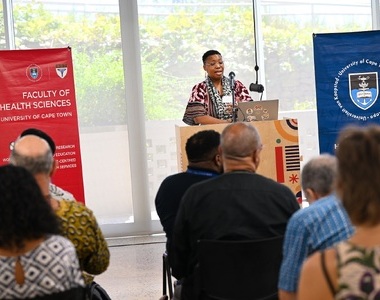Making digital financial inclusion a reality
31 October 2024 | Story Kamva Somdyala. Photos Lerato Maduna. Read time 4 min.
The University of Cape Town’s (UCT) Financial Innovation Hub (FinHub) will be able to continue its work with a new collaboration with the Interledger Foundation as it looks to make digital financial inclusion a reality, using output from the students who will be part of the hub.
The grant – an amount yet to be finalised – will go some way in getting students and researchers closer to the estimated 1.4 billion people worldwide who are currently excluded from traditional banking systems, according to academic director at the hub, Dr Allan Davids. The Interledger Foundation exists to advocate for the adoption of open, interoperable payment solutions while supporting organisations that want to build on Interledger and maintain a robust open-source community.
“In 2018, we noticed a gap in the educational offering in Africa and we designed a degree that catered to the changing needs and requirements of the financial services sector. We wanted students to be able to solve complex problems using hard skills like coding in combination with transformative technologies like blockchain to reimagine global financial services,” said Dr Davids at the reception event.
“This led to the birth of our master’s in financial technology. In this degree, we took students from a variety of backgrounds, including economics, computer science and engineering. Unsurprisingly, we saw the birth of many student-led start-ups looking to disrupt the world of financial services using the skills learned in the classroom. In this process, we realised that our educational offering alone was not sufficient. We needed a space where students could receive links to industry, mentorship, innovate, be creative and receive start-up support. This led to the financial innovation hub.”

Today the hub has been able to raise over R60 million in funding to pay salaries, provide bursaries and take students on study tours. Forty percent of graduates have entered the financial services sector and 18% have started their own companies.
Davids added: “The generous grant of the Interledger Foundation is going to be critical in providing the backbone of funding to support the hub’s operations going forward, taking care of staff costs, provide bursaries and support capacity building initiatives.”
CEO of Interledger, Briana Marbury, said the launch was not only about launching a physical space, but also creating a platform for groundbreaking ideas, solutions and opportunities that will benefit communities in South Africa and beyond. “This hub will serve as a centre for research and development while bringing together students, researchers and entrepreneurs and innovators who are passionate about leveraging technology to solve real-world challenges.
“The students and innovators who walk through the doors will be part of the generation of individuals who revolutionise the way we make payments.”
Financial transformation
The dean of the Faculty of Commerce, Professor Suki Goodman, took the opportunity to firstly pay tribute to former finance minister Tito Mboweni, who passed away on 12 October at the age of 65. UCT awarded Mboweni with a degree in economic sciences (honoris causa) in 2010.
Professor Goodman said the degree was in recognition of Mboweni ensuring stability in the transition to democracy and his effort to bring prosperity to all South Africans. “The work of the hub is aligned with his vision. This partnership affirms our shared commitment to promote financial inclusion across South Africa, meeting the growing need for digital skills to help direct the fourth industrial revolution, providing transformative educational offerings.
“This commitment ensures a steady future for the hub and our student entrepreneurs who first and foremost need financial support to incubate their entrepreneurial ideas; ideas born out of first-hand knowledge of the needs of their communities and for UCT’s important work in developing South Africa’s financial transformation.”

Siphiwe Bogatsu is one student whose idea was on display. From his own experience he is plotting and refining a financial services app which will go a long way in ensuring that people are able to track and pay for things like funeral policies without the risk of late or non-payments. It is an app that can track payments, send notifications and offer communication through WhatsApp.
However, because of the sensitive nature of product, that’s all Bogatsu could offer.
 This work is licensed under a Creative Commons Attribution-NoDerivatives 4.0 International License.
This work is licensed under a Creative Commons Attribution-NoDerivatives 4.0 International License.
Please view the republishing articles page for more information.






























































































































































































































































































































































































































































